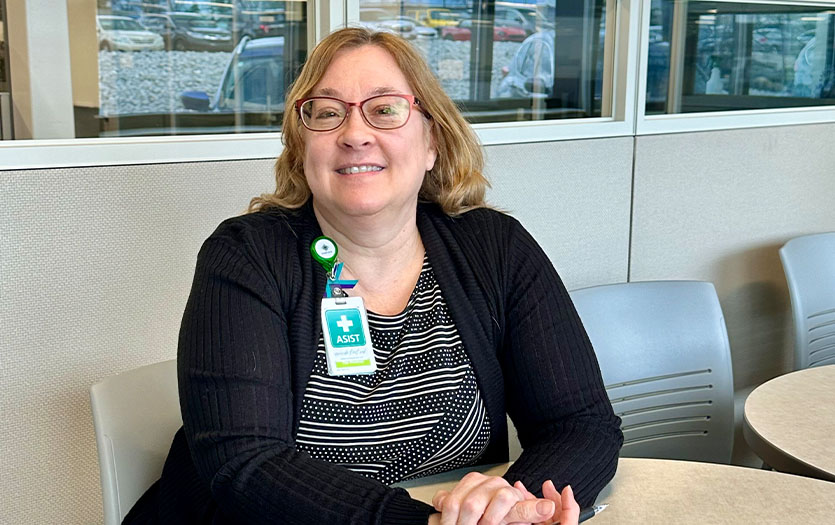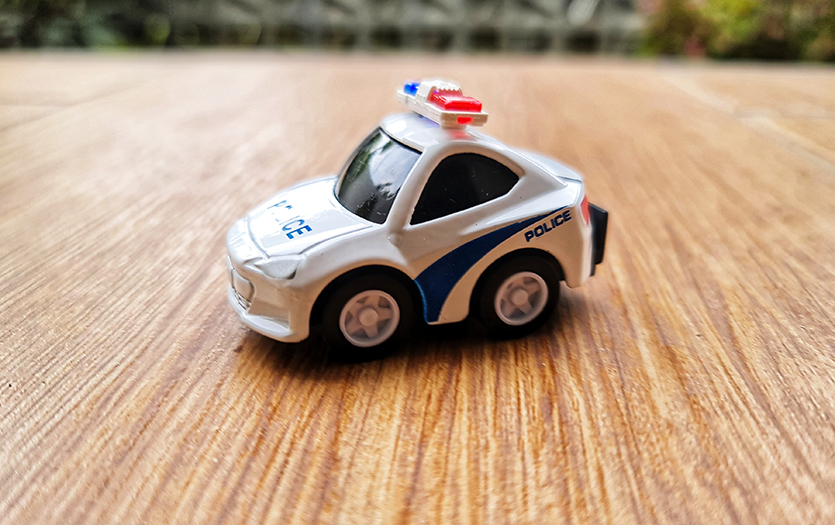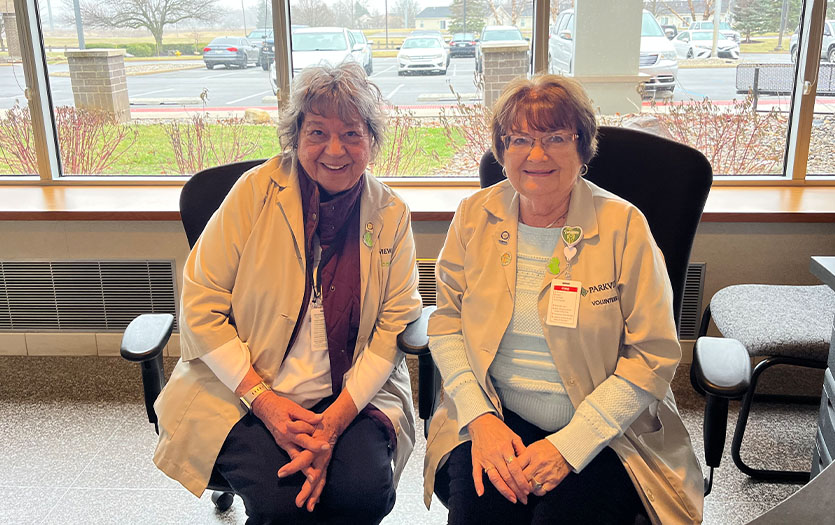
When an individual reaches out during a moment of personal crisis, everything hinges on the voice on the other end of the line. This is something Kimberly Hartman, BA, coordinator, Parkview Behavioral Health Institute HelpLine, knows all too well.
The crisis hotline is available to people of any age, experiencing mental health or substance use issues, seeking information, resources or just someone who cares and is willing to listen.
Kim has been with Parkview for six years and in her current role as HelpLine coordinator for three. “I used to be on the Department of Child Services (DCS)/Criminal Justice team,” she said. “We would process referrals for DCS services, contact people and get them scheduled for diagnostics or additional testing.” While in that position, Kim sat close to the group of caseworkers who answered calls at the former Park Center behavioral health walk-in facility. “It always intrigued me,” Kim shared. “How they were able to help people.”
When the HelpLine moved to the Parkview Behavioral Health Institute intake department as part of the Parkview Access Center, she was drawn to the opportunity to serve in a more crisis-oriented capacity. “I was interested in having more of an immediate effect. People call when they are in need, and we can assist right then.”
Essential skills and collaboration
While Kim has received specialized training for her HelpLine role, much of what she uses daily she’s learned on the job. “I used to be a suicide-watch sitter at Park Center,” she shared. “If someone was suicidal, we would watch them constantly to make sure they didn’t harm themselves. I built up a lot of experience there that I apply in this position.”
That experience includes a repertoire of coping strategies to console. “Depending on where the caller is and what they’re going through, we might use grounding techniques or other means of de-escalation,” Kim said. “The goal is to get them to calm down, so I might encourage them to take a deep breath or close their eyes and visualize a place or situation that doesn’t cause them to feel anxious. I encourage them to imagine how the place smells, what they see, taste or feel. I bring them back to their senses.”
In addition to mindfulness methods, callers are asked a series of evidence-supported questions, which is a suicidal ideation and behavior rating scale. This suicide screening assesses their risk of harming themselves from low to moderate to high. Each risk carries different protocols and procedures.
“We can mobilize the SOS intervention team if needed,” Kim explained. The Parkview Randallia-based team of caseworkers, led by Heather Henry, RN, has been in operation for over a year and can go to offices, schools or public locations, such as a coffee shop or park, to intervene and help further treatment for those in crisis. “We route cases to the SOS team based on risk,” Kim said. “We might get a call from a school about a troubled student threatening to harm themselves or others and we can have the SOS team go and speak with the student and parents, or recommend the child is taken to the nearest Emergency Department. It’s really an incredible program.”
Some situations are more familiar than others. “We do get repeat callers, so some of what we do is building relationships and knowing what the individual is looking for or needs,” Kim said. “A lot of people are dealing with anxiety or depression. Maybe they’re intoxicated and lonely. Often, they’ve alienated the people in their lives and they’re just looking for someone to talk to. And we listen and support them.”
One common thread for nearly all HelpLine callers is a desire for relief. “We have to remind them that it takes time to overcome conditions like anxiety. For the majority of people, it won’t go away with just a pill. It requires a combination of therapy, exercise, nutrition and medication to get it under control. Unfortunately, people wait too long to call and reach out only once they are in crisis and need help now.”
Education and resources
As part of the Parkview Behavioral Health Institute intake team, Kim takes on a variety of duties. “We have eight call specialists and one PRN who can take shifts. I will answer phones if needed, but my role also includes listening and auditing calls to make sure people were helped appropriately and workflows were followed,” she said. Kim constantly looks for opportunities to grow and develop the call specialists, so they are equipped with appropriate training and skillsets to assist callers to the best of their ability. “I also answer questions about scheduling, which we handle, and help coordinate the appropriate interventions for various crises. That might include the SOS team, Parkview providers or services, law enforcement, schools or parents.”
Kim and the HelpLine team facilitate a lot of education, for those in need as well as those closest to the person in crisis. “We might speak with a parent about securing things like firearms, medications, car keys and sharp objects to make sure everyone is safe,” Kim explained.
But a significant piece of what the team does is provide resources. “We can connect people to grief counseling, housing resources, food banks, clothing, maternal needs, transportation and mental health assistance. We have a database of resources to offer for almost any need.”
A voice of reason
Any time you’re dealing with a person in a heightened state, it can be stressful, Kim shared. “You have to be compassionate and patient. We want them to do most of the talking, and then we can glean a lot of information from what they’re saying and how they’re saying it.”
You also have to be a fast thinker and swift problem solver. “While we’re taking in the person’s situation, we’re also reading their chart to see if they’ve called before, if they have a therapist or care plan, what medications they’re taking and any other knowledge that could be helpful. Maybe they stopped taking their prescription or it needs to be adjusted. If they already have a safety plan, we can go over that with them. Did you listen to music? For how long? Did it help? Did you take a hot bath or watch your favorite movie for a little distraction? Our HelpLine specialists have to be able to think quickly about how to best help the person reaching out.”
If someone is assessed as a lower risk, it doesn’t mean they don’t need intervention. “Just because their situation is less of a threat, we never minimize what they’re going through. It is urgent and a crisis for them. We try to schedule the individual with a PBHI therapist or get them services as soon as possible. People are more motivated to take action while they’re in crisis, versus after it’s passed. If we can get them connected to someone who can help, the next time might be easier for them to navigate.”
Skills for the job
Empathy is a requirement of any HelpLine position. “Mental health is different in that people aren’t always rational. Sometimes they are hallucinating or hearing voices telling them to harm themselves. And those voices are real to them. We have to be empathetic and caring and guide them through it the best we can.” Kim shared that having loved ones with mental health or substance use issues can make it easier to relate to the people calling. “It can help with understanding what the person is thinking or feeling.”
At the end of the day, the greatest gift HelpLine co-workers can offer is one universally sought. “We try to give them hope that it can get better, treatment does work. Therapy and medication combined can be effective. You have to do the work. You have to take care of yourself. But there is hope.”
For Kim, the joy comes from knowing she has made a difference. “When we stop someone from harming themselves or others, that’s the most rewarding part,” she said. “I’ve had women call who were suffering from postpartum depression, and, I have three children, I know it’s hard! They don’t want to harm their baby, but they’re depressed. When I can talk to them and get them help and keep their baby safe, it means so much. We see every age, every situation, and we don’t always find out how things went after the call ended. Sometimes, we follow up, to make sure they did what they said they would, or got the services they needed, but of course, there are always the ones you wonder about.”
To do this work, you have to have a tireless well of compassion to draw from. “It’s amazing how many people in our communities need help. How many are at their wit’s end. Who need to call a stranger to seek out whatever help they can get. To be good at this work, you have to care about people. You have to be the friendly voice on the other end of the line.”
Call the PBHI HelpLine at 260-471-9440 or toll free at 800-284-8439, anytime 24 hours a day. The experienced specialists can answer your questions, provide recommendations and help arrange care. “We are always here,” Kim said. “Holidays, weekends, the middle of the night. Someone will answer.”



